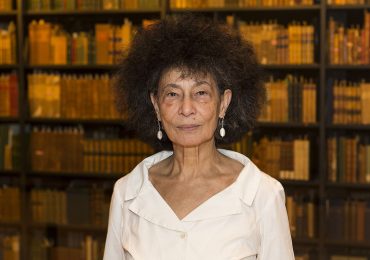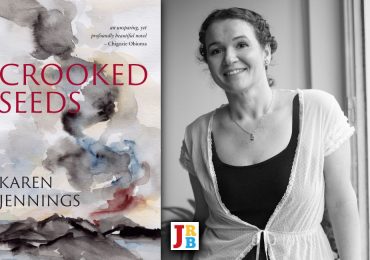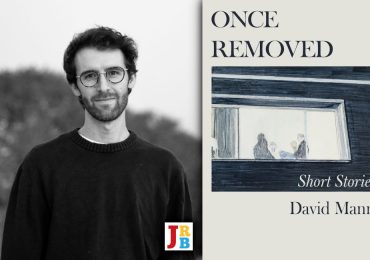The R335 curves around the eastern border of Addo Elephant Park and spools north through the cushiony green hills of coastal Eastern Cape until the dry interior begins to assert itself.
By then, the reverie of the long road has set in. A sloughing off has happened. Travellers from cities scabbed with development might feel, as the Dutch poet Lucebert writes in ‘Nazomer’:
ik heb in het gras mijn wapens gelegd
en mijn wapens gaan geuren als gras
‘I laid my weapons in the grass / and my weapons will smell of grass’.
The two-and-a-half-hour drive from Gqeberha to Somerset East feels like sinking into something, like a bucket descending into a well, perhaps, or a plant being uprooted from a pot and transferred into a garden’s richer soil.
For the past three years, more than eighty South African writers have experienced, in one way or another, the road to Paulet House in Somerset East. After a stint there, their own roads have led outwards towards publishing, performance, productions—even prizes in some cases.
Paulet House’s façade is compact; it’s a bright, white double-storey that stands out among its near neighbours as well maintained. Its freshly painted flat front and rectangular, green-framed sash windows are Georgian; its pitched roof Victorian. Behind the house, stretching the length of the large Somerset East town block, is a pretty garden.
‘It’s a space that says: here, create, it’s okay,’ says novelist Mia Arderne, whose 2020 novel Mermaid Fillet ripped the backbone out of South African English and Jenga’d it back together like it had never been done on the page before.
Arderne was at Paulet House in June 2022 to work on a young adult fantasy novel that uses indigenous mythological elements to inform the world of the story. She was there with five other published and experienced authors as part of the 2022 PEN Residency, which provides writers an opportunity to work on current projects.
And while PEN is a partner for one of the programmes at Paulet House, the person making the rain in arid places for South Africa’s poets and songwriters and novelists and playwrights is the late Jakes Gerwel.
For Paulet House that the writers stay in is his house, in the town where he was born. And it’s his legacy that fuels the engine that is driving possibly the most dedicated posthumous support of the literary arts this country has ever seen.
Jakes Gerwel died ten years ago this month at the age of sixty-six. His years of service towards liberation, his activism, his academics, his political involvement, his friendships and associations, his university leadership, his membership of various boards, and his steadfast love of and loyalty towards Afrikaans—which he critiqued heavily as the language of the oppressor—ensured that he was remembered in death with the same deep, full, all-round respect that followed him through his busy life.
The words most frequently associated with Gerwel are ‘integrity’ and ‘humility’. That he became such a fundamental cog in the wheel of South Africa’s transition to democracy; that he became a good friend of and the main speech writer for the country’s most adored and internationally celebrated president, Nelson Mandela—these heights did not alter the basic truth of who he was: a questing scholar, a passionate reader, a critical thinker.
His aesthetic engagement with the literary arts was never divorced from social awareness, nor did the brutal oppression of South Africans of colour by whites, most prominently white Afrikaans speakers, rob him of his love for his mother tongue.
Jakes Gerwel embodied, in life, the most vivid dream for what literature can make of us: empathic, justice focused, engaged, humane, flexible, broad thinking, service oriented and fair minded. He was a books person who was a living advert for the ennobling art of reading.
It is in this spirit that the Jakes Gerwel Foundation contributes towards nurturing the country’s writerly talent through Paulet House.
In 2015, an arterial road in Cape Town, the M7, which used to be called Vanguard Drive, was renamed Jakes Gerwel Drive. The road leads to the University of the Western Cape, where Gerwel worked for many years before becoming, first, the Dean of Faculty of Arts, and then the rector and vice-chancellor of what had become known as ‘the intellectual home of the Left’.
Look, a road is a road is a road. It’s nice for one to be named after you, but the link between a street’s name and the life that inspired it is soon lost in history’s forward plod. A foundation that supports the development of South African writers in order to build out the body of South African literature, on the other hand, to help new perspectives and worlds of experience be heard, and to encourage an appreciation of the literary arts among children—now that’s a historic legacy with vigour.
‘There was a sense of community between writers, which I’ve never experienced before,’ Arderne told me. ‘This made it easier to feel okay about prioritising my craft … Sharing and learning about each others’ processes was enlightening and it sort of normalised being a writer in South Africa, which I find is usually a harrowing solo path. This residency created an alternative to that, one in which we were together and were being treated well.’
There are many ways in which being a writer is hard. Being taken seriously, not just by the world, but by yourself, isn’t easy. Shana Fife, author of Ougat, was working with a mentor on a novel about rape culture on the Cape Flats when she was at Paulet House.
‘Paulet House made me sure that I was actually a writer. I had toyed with the idea before but being on the programme and learning the intricacies of book writing and being surrounded by other aspiring (and established) authors was an eye-opening experience into myself and my goals.’
Elodi Troskie, who worked on a debut collection of poetry when she was there earlier this year, said there wasn’t sufficient support for anyone in South Africa who was trying to work in creative spaces. ‘That may be part of the reason it took me so long to start taking my own writing seriously. It is difficult to make a living out of the arts. It requires a boldness that can be exhausting. It is because opportunities like this residency are so scarce in South Africa, that this one truly makes its mark.’
Bronwyn Davids, author of the lovingly crafted and well-received narrative non-fiction Lansdowne Dearest—a story about the disruption and destruction caused by forced removals—was one of the first beneficiaries of the Jakes Gerwel Foundation’s seriousness about making space for new voices to tell their stories. Davids’s book was rejected by one of South Africa’s most dynamic and sharp-eyed publishers, Na’eemah Masoet, who was, according to Davids, ‘unimpressed’ with the first draft.
‘The only thing she was impressed with was that I could write. She suggested I go back to the drawing board. In my case the drawing board was a pink floral ironing board that I preferred to use as a desk at the time.’
The publisher for which Masoet works, NB Uitgewers, had partnered with the Foundation, and applied for support so that Davids could finish the work she’d begun. Her manuscript was read by the foundation’s executive director, Theo Kemp, and she was picked for the inaugural residency at Paulet House in 2019.
What did the residency offer Davids that she couldn’t find at home?
‘Everything. Space, light, quiet, natural beauty, a sense of home, good company and nourishment on all levels. Sufficient distance from my home town, perspective and guidance from my mentor.
‘I’ve travelled extensively and wandered around six continents on my own. At home I spent years gobbling up books, music and movies. I also spent years madly painting to push the boundaries of mind, to see what I could do with images. None of that led to that sense of having finally arrived and rooting myself in something. I would say that travelling back and forth to Paulet four times in 2019 was the best travel experience of my life because there was so much learning. It was a transformative experience.’
The musician and poet Loit Sōls spent a month at Paulet House this past winter finishing the final text and cover design of Moerstaāl, his second collection of poetry, released in August this year.
Of the writers who gathered around the long dining table at Paulet House every evening, under the stern but not unfriendly gaze of a portrait of Jakes Gerwel done by the Eastern Cape artist Dhatini Mzayiya, Sōls had the most direct link to the man whose investments now facilitate the development of writing in South Africa.
Sôls valued his time at Paulet deeply for the time to write, rewrite ‘and even dither in between’, for the three solid meals a day, the free wifi, the well-stocked pantry, bar fridge and coffee jar, the landscaped garden, the people who cleaned for him and ‘a certain level of comfort, gentility and convenience’.
‘I also had greater access to the legacy and spirit of Jakes Gerwel, who advised and facilitated my first book, My straat en anne praat-poems, which Kwela published in 1998.’
The Jakes Gerwel Foundation was founded by Gerwel’s widow Phoebé Gerwel. His son Heinrich serves on the board. Paulet House, which belonged to Gerwel, whose heart, it seems, never truly left the Eastern Cape, was donated to the Foundation by Phoebe, who herself is from the Western Cape.
The double-storey building was restored in preparation for its work as a home for literary production and now resembles the child of a marriage between one person’s residence and another’s guest house.
The reception rooms are comfortably furnished, and the dining room is lined with packed bookshelves that surround a fireplace that is never cold in winter. The bedrooms, up a creaky flight of stairs, are pretty, with views from some of the rooms to Bosberg, the mountain that marks the small town’s northern boundary.
The kitchen is spacious and busy, connecting the back garden to the rest of the house. The constant traffic through the heart of the home, and the impromptu gatherings where poems might be read while everyone stands around with a glass of something in their hand, doesn’t seem to bother chef Gilbert van Zyl, who lavishes celebration-like feasts on residents without breaking a sweat.
Tortoise carvings dot the house—totemic for the simple reason that Gerwel liked tortoises. Large black-and-white photographs of Gerwel in his busy political days, and a small collection of South African art, contribute to the sense that one is visiting someone’s personally curated space.
The garden is inviting too, stretching south and offering nooks and surprises. It was here that Mphuthumi Ntabeni, author of The Broken River Tent and The Wanderers, spent a lot of time during his winter stay at Paulet, seeking out pale patches of sunlight in which to warm his skin while he read.
‘I worked on the second instalment of my River People trilogy, which is a creative history take on the Frontier era history of the Cape Colony. This history has been told mostly through the eyes of the white settlers and British colonial government. I’m trying to recreate a native point of view of it, with greater emphasis on the Xhosa history, oral and otherwise.
‘Paulet House gave me free time and a salubrious environment to consolidate my research and write. The added bonus for me was that I needed to consult some documents at the Graaff-Reinet Museum. We even visited the National Arts Festival. It was running in-person shows again for the first time since lockdown.’
There are various programmes at Paulet House during the year. On top of providing time for people simply to work uninterrupted on manuscripts they’re busy with, there are mentorships for emerging writers of fiction and non-fiction, and workshops for short story writers, playwrights and songwriters. The mentors themselves have all had professional success, are well known in their fields and are working writers and performers.
‘I want us not to just help get people published,’ said Kemp, who runs the daily business for the Jakes Gerwel Foundation, ‘I want us to get those people on to literary prize shortlists. The work here has to be meaningful and sustainable. We want the best talent to emerge from the work we do and for that talent to go on to be successful.’
Many of the books and plays written at Paulet have won accolades, and several books were in production at the time of writing.
Europe and the United States seem to have endless programmes and residencies available for writers, but there’s hardly anything to apply for in South Africa, and so the Jakes Gerwel Foundation is forging a brave path. The literary arts are less well paid and attract less money than, for instance, the visual arts. Very few foundations see the production of quality writing as more necessary than, say, support for education or health.
Every writer interviewed for this story lamented the lack of backing for their work.
Ntabeni expanded. ‘Look, there’s the Johannesburg Institute for Advanced Study, which is a four-month programme. Then there’s the Stellenbosch Institute for Advanced Study, which I am told is a wonderful fellowship with a more academic bias. These all try to support South African writers one way or the other, but looking at other countries, even on the continent, I think we’re lagging behind.
‘It is not a coincidence that Nigeria and Kenya have thriving literary scenes, which also shows in the quality of the writers they produce. Their government and private capital plough significant resources into the literary arts. We have also been let down by a directionless, corrupt and moribund national Department of Sport, Arts and Culture. Our private capital doesn’t seem to understand the value of reading for pleasure to a country’s developmental psyche and imagination. I think public and private institutions could do much more.’
The direct intent of the residencies offered by the Jakes Gerwel Foundation may not have been to nurture relations so much as to produce publishable work, but it seems fitting that they do the former, too, since the way we talk about and with one another was something Gerwel himself often thought about. Community, communication, contact and conversation were integral to his work.
Troskie said, ‘Beyond the work I was able to do during this time, the connections made with fellow writers and other members of the foundation’s ecosystem continue to impact me.’
The road from Somerset East back to the airport at Gqeberha is unchanged after a stay in a quaint little house once owned by one of South Africa’s most principled anti-apartheid activists. But the people who drive it to return to the hard-scrabble life of the jobbing author are very much changed.
Davids said, ‘Every mentorship is a gift that keeps on giving because of the connections you make at Paulet. Residencies lead to special bonds, altered perspectives and a longing to return.’
- Karin Schimke is a writer. She works as an editor of fiction and non-fiction and has won prizes for her poetry and her literary translation. She is based in Cape Town.






“It is not a coincidence that Nigeria and Kenya have thriving literary scenes, which also shows in the quality of the writers they produce. Their government and private capital plough significant resources into the literary arts.”
Laughs in Kenyanese, where there is no support at all from the government, and very little from private capital for literary arts, and where we look at South Africa with envy
I am a journalist and writer, I am currently looking for a bursary/funding to complete my Master’s degree in Journalism and Media Studies here at Rhodes University, Grahamstown. Last year I had to drop out of classes due to a lack of funding. It is for this reason that I became so excited upon receiving an email from my former lecturer, Dr. Themba Masilela, encouraging me to contact your institution with the hope of securing some sponsorship. I have a litany of unfinished and half-cooked scripts lying all over the house. It precisely for this reason that I was so inspired reading the creative piece by Karin Schinke, giving readers a lovely and inspirational sneak peek into the late Professor Jake’s Gerwel’s home. In this regard, I would be truly honored if you would consider me for some funding so that I can complete my Master’s in Creative Writing. Thank you and God bless. Simphiwe Xako